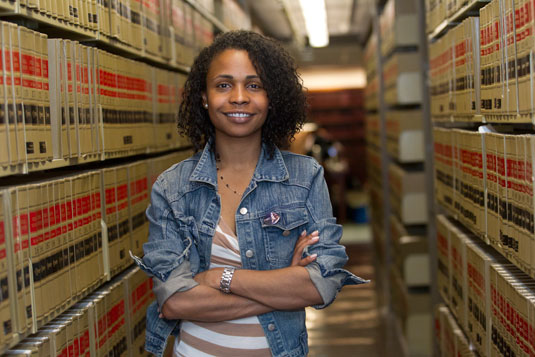Family connections compel deep desire to help in Haiti

Jane Charles-Voltaire feels as though she has lived two lives simultaneously — one in America and one in Haiti. While she grew up in Brooklyn and Montreal, both of her parents and much of her family are from Haiti, and she has spent a lot of time there. She plans to return to the nation this fall to use her Temple Law degree to help improve life for its people.
Temple Times: Where are you from and where did you grow up?
Jane Charles-Voltaire: I grew up in the Park Slope neighborhood of Brooklyn, surrounded by a lot of extended family. Both of my parents are from Haiti, where many relatives and family friends still live. We visit so frequently that it’s basically like having another life. I’ve also spent a lot of time in Montreal, where my father and half-sister live.
TT: What did you pursue as an undergrad at Wesleyan?
JCV: I majored in romance languages because I wanted to go abroad as much as possible. I grew up speaking French and English, picked up Creole because it was kind of always in the background and then learned Spanish in high school. I wanted to live in places where I could master my language skills, and spent six months in Paris and six months in Buenos Aires.
TT: How did your career focus evolve?
JCV: My focus shifted to postcolonial literature, which greatly influenced the social policy thought process I have now, as well as my interest in social justice. But then I realized I had to do something more because literature wasn’t going to be enough for me. At that point, I figured my services and skills would be better used if I were able to do something on behalf of people and decided to pursue law.
TT: You took a year off between Wesleyan and law school. How did that year shape you?
JCV: For the first six months, I worked at the Legal Action Center in Washington, D.C. It was a small organization, so I had the chance to do a lot — go to the Hill, attend hearings and write reports. The job really helped me see the different roles lawyers can play.
I spent the next six months in Haiti. I really wanted to see if I could step beyond my familial ties and see myself working there and living there. I got some amazing opportunities to work with really incredible women at the Ministry on the Condition of Women and a non-profit cultural center.
TT: Why did you choose Temple?
JCV: There was something about Temple that just seemed to catch me. I was excited about the idea that I’d get a lot of practical experience at the law school, which I would need to be able to implement all the ideas I have.
TT: What has been most meaningful about your time at Temple?
JCV: Law school was not easy. I can say that now smiling and laughing but I definitely had a lot of moments of doubt. It wasn’t that I’d made the wrong choice, but rather I didn’t feel I was living up to expectations — my own or anyone else’s. I was lucky though because I asked for help and help came in floods. Professor (Jeremi) Duru mentored me for the past two-and-a-half years. He helped me figure out what I needed to get better at and gave me enormous amounts of motivation.
I learned I’m well-suited to writing and this totally changed things around. Through writing, I’ve been able to explore issues I’m passionate about: environmental refugees, gender violence, peacekeeping, climate change and water quality standards.
Having the opportunity to shape my law education around my interests has been incredible, and finding out that I can be successful at it is all the better. I feel lucky I’ve been able to make it to work for me.
TT: What are your plans after graduation?
JCV: Over the summer, I’ll study for the New York bar and then in the fall move to Haiti. I’m very clear that being there is my priority. I’m putting out feelers for positions dealing with humanitarian or human rights issues. I feel lucky that I already have a system of support there because it puts me in a better position to reach my capacity.
TT: Do you have any concerns about living and working in Haiti?
JCV: Right now, there is a big need for professionals in Haiti and there is a lot in aid money. I want to be sure that any job I take is not just taking advantage of that money. I want to make some kind of sustainable contribution to something that’s actually needed.
There’s extreme fragmentation between classes in Haiti and as a result, there are some cruel realities. I am of Haitian descent but I am an American so I’ll have certain privileges automatically. I’m very conscious of personally not exacerbating or contributing to the disequilibrium.
— Eryn Jelesiewicz